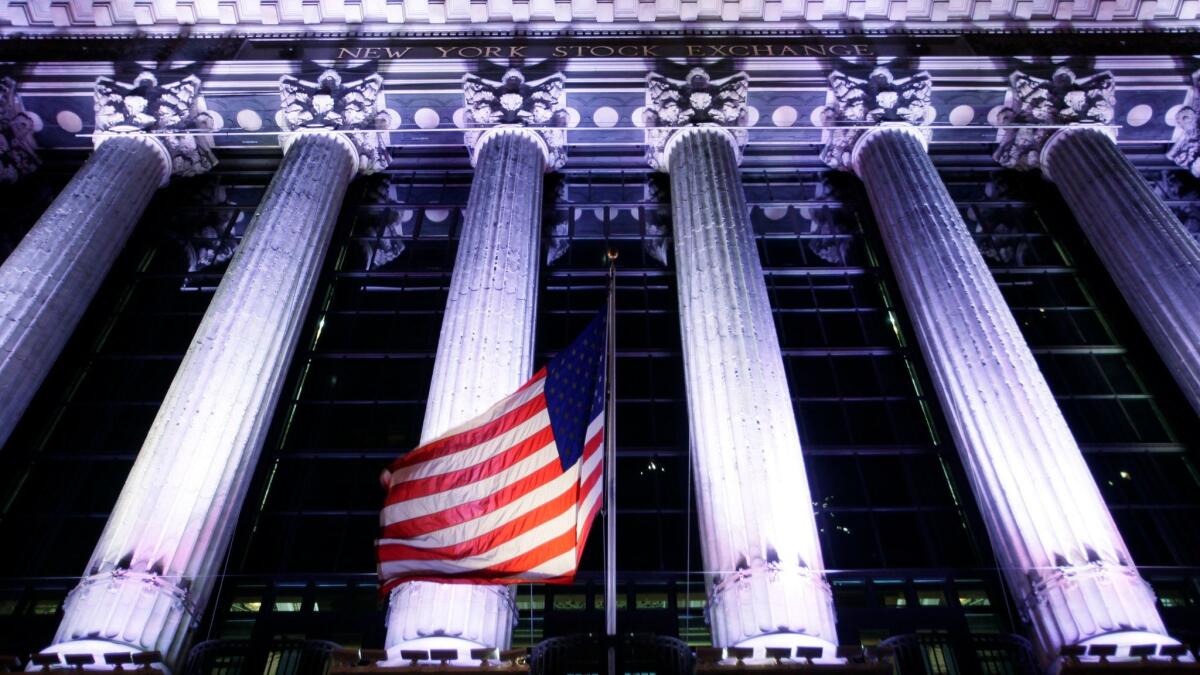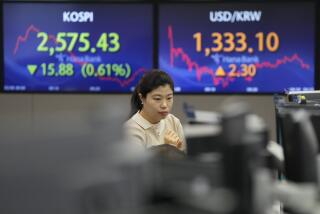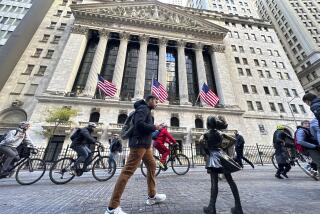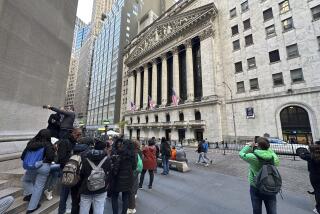Stocks end mostly higher; industrial companies climb

U.S. stocks closed mostly higher Thursday after a wave of selling late in the session erased much of the day’s gains.
Gains in industrial companies and other sectors outweighed losses in banks and healthcare stocks. Energy companies rose after crude oil prices recovered from an early slide.
Bond yields declined after spiking to four-year highs a day earlier amid rekindled fears of higher inflation and interest rates.
“The yields easing back a little bit is probably reassuring people on a very short-term kind of basis,” said Erik Wytenus, global investment specialist at J.P. Morgan Private Bank. “That big, nasty intraday reversal [Wednesday] was probably a little bit excessive.”
The Standard & Poor’s 500 index edged up 2.63 points, or 0.1%, to close at 2,703.96 on Thursday. The Dow Jones industrial average climbed 164.70 points, or 0.7%, to 24,962.48. Earlier in the day, the 30-company average was up more than 350 points. The Dow and the S&P 500 snapped a two-day losing streak.
The Nasdaq was up much of the day but closed lower. It slipped 8.14 points, or 0.1%, to 7,210.09. The Russell 2000 index of smaller-company stocks edged down 1.85 points, or 0.1%, to 1,529.99.
The stock indexes are on track to close lower for the week.
Bond prices rose. The yield on the 10-year Treasury fell to 2.92%; a day earlier, it climbed to 2.95%, the highest level since January 2014. Wednesday’s spike in bond yields came after the Federal Reserve’s minutes from its January policy meeting showed bullish sentiment among policymakers, confirming their intention to raise interest rates this year.
Higher yields generally hurt stock prices by making bonds more appealing to investors. They also make it more expensive for people and companies to borrow money. Earlier this month, global stock markets, particularly those in the U.S., suffered big losses amid mounting concerns over the pace of inflation and Fed policy tightening.
“Volatility is back, and I actually would argue that it’s a healthier state of affairs,” Wytenus said. “The constant melt-up that we saw in 2017 is actually quite historically abnormal.”
Industrials stocks posted solid gains. United Technologies rose 3.3% to $133.58 after its chief executive said management is looking into the possibility of splitting up the industrial conglomerate into three separate businesses. Caterpillar also notched gains, climbing 2.3% to $158.86.
Chesapeake Energy was the biggest gainer in the S&P 500, soaring 21.7% to $3.20. The company led an energy-sector rally.
Avis Budget Group jumped 13.4% to $44.20 after the car rental company posted earnings.
Roku slumped 17.7% to $42.05 after the video streaming device company’s latest guidance disappointed analysts.
Pandora Media’s first-quarter revenue guidance also fell short of Wall Street’s forecasts. The music-streaming company’s shares tumbled 7.2% to $4.52.
Green Dot leaped 10% to $66.30 after the Pasadena issuer of prepaid debit cards posted quarterly results that pleased investors.
Banks and other financial stocks lagged the most. Brighthouse Financial slid 4% to $55.17.
Benchmark U.S. crude recovered from an early slide, rising $1.09, or 1.8%, to settle at $62.77 a barrel in New York. Brent crude, used to price international oils, rose 97 cents, or 1.5%, to close at $66.39 a barrel in London.
In other energy futures trading, heating oil rose 2 cents to $1.95 a gallon. Wholesale gasoline rose a penny to $1.77 a gallon. Natural gas fell 3 cents to $2.63 per 1,000 cubic feet.
The dollar slid to 106.64 yen from 107.78 yen. The euro strengthened to $1.2329 from $1.2300.
Gold rose 60 cents to $1,332.70 an ounce. Silver fell 3 cents to $16.59 an ounce. Copper rose 3 cents to $3.24 a pound.
Major stock indexes in Europe closed mostly lower. Germany’s DAX fell 0.1%, and the CAC 40 in France gained 0.1%. The FTSE 100 index of leading British shares declined 0.4% after figures showed the British economy did not grow as strongly as initially thought during 2017.
In Asia, Japan’s benchmark Nikkei 225 index slumped 1.1%, and South Korea’s Kospi shed 0.6%. Hong Kong’s Hang Seng lost 1.5%.
UPDATES:
2:55 p.m.: This article was updated throughout with closing prices, context and analyst comment.
This article was originally published at 7:25 a.m.






